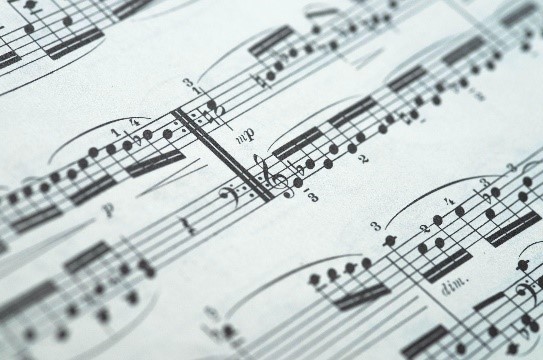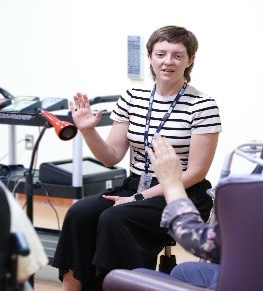The ability and need to respond to music is innate and usually unimpaired by mental and physical health challenges. Certified music therapists work with people of all ages facing a range of challenges. At Baycrest, music therapy is offered in both the Hospital and Apotex Centre, Jewish Home for the Aged, in individual and small group settings. No musical ability or training is needed to benefit from music therapy, and sessions can be provided in person, virtually or in a hybrid format. Baycrest music therapists’ welcome interns from training programs approved by the Canadian Association of Music Therapists.
 What is music therapy?
What is music therapy?
Music therapy is a discipline in which certified music therapists use music purposefully within therapeutic relationships to support development, health and well-being. Music therapists use music safely and ethically to address human needs within cognitive, communicative, emotional, musical, physical, social and spiritual domains. (Canadian Association of Music Therapists, 2020)
What are a music therapist's qualifications?
Certified music therapists have completed undergraduate and/or graduate degrees in music therapy, a 1000-hour supervised clinical internship and a certification exam. After passing the Certification Board of Music Therapists exam, they receive the MTA (Music Therapist Accredited) credential signifying they are qualified to practice music therapy and will adhere to the Canadian Association of Music Therapists' Standards of Practice and Code of Ethics. In Ontario, music therapists can also register to be part of the College of Registered Psychotherapists (CRPO).
What happens in a music therapy session?
Music therapists use various active and receptive techniques according to the needs and preferences of the residents or patients. These techniques are not limited to:
What are the benefits of music therapy?
Music therapy can help with a wide range of challenges and needs. Music therapists design and facilitate individualized music experiences with these challenges and needs in mind. This is what differentiates music therapy from entertainment. Benefits might include:
-
Increasing self-expression
-
Improving communication
-
Increasing mobility and motor function
-
Enhancing social skills and interaction
-
Increasing relaxation
-
Improving or maintaining cognition and memory
-
Personal development
-
Increasing alertness and sensory stimulation
-
Exploring and resolving personal issues
“Music Therapy can make the difference between withdrawal and awareness, between isolation and interaction, between chronic pain and comfort – between demoralization and dignity.”
“Music is part of being human.”
Resources:
The Canadian Association of Music Therapists www.musictherapy.ca
Voices: A World Forum for Music Therapy www.voices.no
Music Therapy Association of Ontario www.musictherapyontario.com
World Federation of Music Therapy www.musictherapyworld.net
 Buddy’s Glee Club
Buddy’s Glee Club
This program provides clients in the Apotex Centre, Jewish Home for the Aged and Mountainview Club with the opportunity to participate in a choice program/ community music therapy group. Each week, clients practice specific songs and work toward performance goals. The program, which is led by a music therapist, is modified to suit the abilities and functioning levels of the clients. Goals include promoting a sense of belonging and interactions within a community, and improving emotional wellbeing, health, and overall quality of life.
Find out more about Buddy's Glee Club, click here.
To make a referral
Anyone can make a music therapy referral. To do so, please contact a member of the music therapy team. You can also speak to the recreation therapist on the unit where you or your family member resides and he/she will get in touch with the music therapy department.
Contact Us
Chrissy Pearson, MTA, RP, FAMI – 416-785-2500, ext. 5458 cpearson@baycrest.org
Gloria Lipski, MA MA RP MTA – 416-785-2500, ext. 5457 glipski@baycrest.org
Justine Stehouwer, MTA, RP – 416 785-2500, ext. 3681 jstehouwer@baycrest.org